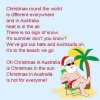No snow here I'm afraid.
Heat and bushfires, and beaches too.
View attachment 795008
to drag the literary standard down
View attachment 795007
it's
View attachment 795009
A Christmas poem from the bush bard Banjo Paterson, the man who wrote "The Man From Snowy River". Eul may find the language rather interesting:
Santa Claus In The Bush
by Andrew Barton "Banjo" Paterson - 1864-1941
It chanced out back at the Christmas time,
When the wheat was ripe and tall,
A stranger rode to the farmer's gate--
A sturdy man and a small.
"Rin doon, rin doon, my little son Jack,
and bid the stranger stay,
And we'll hae a crack for Auld Lang Syne,
for the morn is Christmas day."
"Nay noo, nay noo," said the dour guidwife,
"But ye should let him be,
He's maybe only a drover chap,
From the land o' the Darling Pea."
"Wi a drovers tales, and a drover's thirst
tae swiggle the hail nicht through,
Or he's maybe a life assurance carle,
to talk ye black and blue."
"Guidwife, he's never a drover chap
for their swags are neat and thin,
And he's never a life assurance carl
with the brick dust burnt in his skin."
"Guidwife, guidwife, be nae sae dour---
for the wheat stands ripe and tall
And we shore a seven pound fleece this year,
ewes and weaners and all."
"There is grass to spare and the stock are fat,
where they whiles are gaunt and thin,
And we owe a tithe to the travellin' poor,
so we maun ask him in."
"Ye can set him a chair at table side
and gie him a bite tae eat,
An omelette made of a new-laid egg,
or a tasty bit o' meat."
"But the native cats hae taen fowls--
they havena left a leg,
And he'll get nae omelette at
a' till the emu lays an egg."
"Rin doon, rin doon, my little son Jack,
"to whaur the emus bide,
Ye shall find the auld hen on the nest
while the auld cock sits beside."
"But speak them fair and speak them saft
lest they kick ye a fearful jolt,
Ye can gie them a feed of the half inch nails
or a rusty carriage bolt."
So little son Jack ran blithely down
with the rusty nails in hand,
Till he came where the emus fluffed and scratched
by their nest in the open sand.
And there he has gathered the new-laid egg---
'twould feed 3 men or 4,
And the emus came for the half inch nails
right up to the settlers door.
"A waste o' food," said the dour guidwife,
as she took the egg with a frown,
"But he gets nae meat unless
ye rin a paddy-melon down."
"Gang oot, gang oot, my little son Jack---
wi your twa-three doggies sma,
Gin ye come nae back wi a paddy-melon,
then come nae back at a'."
So little son Jack he raced and he ran
and he was bare o' the feet,
And soon he captured a paddy-melon---
was gorged with stolen wheat.
"Sit doon, sit doon," my bonny wee man;
"to the best that the hoose can do,
An omelette made o' the emu egg,
and a paddy melon stew."
"'Tis well, 'tis well", said the bonny wee man,
"I have eaten the wide world's meat,
And the food that is given with right good will
is the sweetest food to eat."
"But the night draws on to Christmas Day
and I must rise and go,
For I have a mighty way to ride
to the land of the Esquimaux."
"And it's there I must load my sledges up
with the reindeers four-in-hand,
That go to the North, South, East and West---
to every Christian land."
"Tae the Esquimaux," said the dour guidwife---
"ye suit my husband well,
For when he gets up on his journey horse
he's a bit o' a liar himsel'."
Then out with a laugh went the bonny wee man--
to his old horse grazing nigh,
And away like a meteor flash they went
far off to the Northern sky.
When the children woke on the Christmas morn,
they chattered with might and main,
For a sword and a gun had little son Jack,
and a braw new doll had Jane,
And a packet o' screws had the twa emus;
but the dour guidwife got nane!
[/Q
I enjoy a good poem, even when I don't always get the meaning. A gentleman could talk me into being naughty with a poem, a glass or two of wine and a crackling fire place. Or a lady for that matter.














